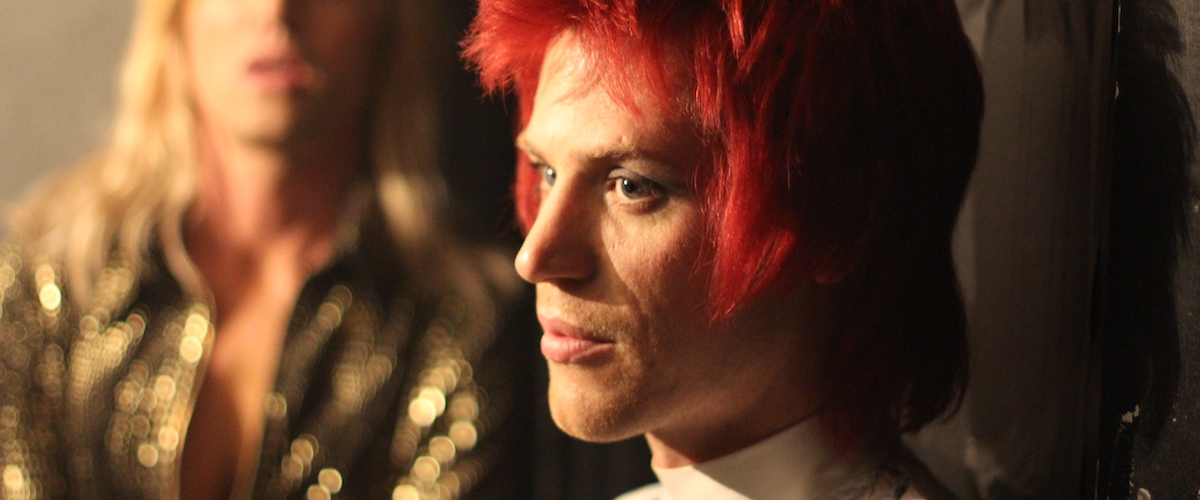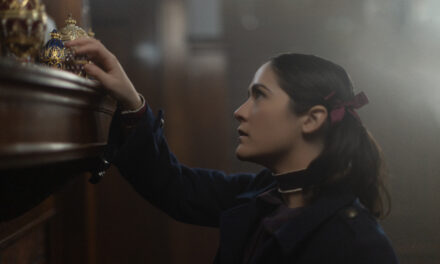Ziggy Stardust. Aladdin Sane. The ‘Berlin’ period. David Bowie‘s legacy is enduring because, throughout his life, he stretched the possibilities of what we could be. One of the few consistencies of his life was the pillar of transformation. He moved through personalities and musical genres like a chameleon fitting in with the colors of their surroundings. It established a groundbreaking allure and admiration that will permeate throughout time.
How would a biopic be able to humanize, better yet, quantify Bowie the man and the many evolutions he went through? Is that even possible? Director Gabriel Range would attempt to do this with Stardust, a quasi-biopic that is a snapshot into a small period of David Bowie’s beginnings. With this, Range would have to do it without the use of Bowie’s musical catalog, as his estate did not approve of the film or give the approval to use his music. Thus, the movie begins with the tagline that the contents of the film are (mostly) fictitious.
Stardust begins in 1971 as Bowie comes to the U.S. for a promotional tour as the release of 1970’s The Man Who Sold the World. Resistance meets him at almost every turn, even as he arrives at the airport. He gets ridiculed for his androgynous style of dress, equipped with the wrong type of visa that doesn’t allow him to perform conventional shows, and his record label doesn’t have any faith in him. Bowie plays these trade shows of vacuum salespeople that don’t really pay attention to him. The first two acts of the film strive to highlight the struggles of a budding musician trying to find his identity.
Johnny Flynn‘s portrayal of Bowie is fine as he toes the line of being a doe-eyed observer of the cities he travels through and a man who is having trouble putting a finger to embrace the complexities of his mind and artistry. Range also tries to show Bowie’s unconventionalism through the relationship with his wife Angie (Jena Malone). At first, Stardust shows their relationship as open to experimentation with no secrets. Angie herself reiterates that they agreed to be two equals halves, a ruling king and queen. However, as the movie goes on, they turn into a bickering couple that forgets their own mission together.
Stardust has a sub-plot that involves Terry Jones (Derek Moran), Bowie’s brother who deals with schizophrenia – maybe even hints at a family curse. Much of the film’s second act invests a considerable amount of time showing flashbacks and the manifestation of Bowie’s fear that his fate will be the same. Considering this, there’s a point in the film where they blaze through situations such as Bowie’s meeting with Andy Warhol or going to a Velvet Underground show and realizing that Lou Reed has not been fronting the band for some time. Bowie’s fear of his own mind appears to be real, but it pushes them to be intertwined within his journey as a musician that doesn’t quite click.
The movie opts to go the conventional, rock biopic route. It shows an artist at his lowest point, an inner struggle to deal with familiar structures, both domestic and nuclear, and the ultimate triumphant performance at the end of the film. We get to witness the grand entrance of Ziggy Stardust and The Spiders, but not so much how the alter ego came to be. That’s the drawback to not being able to access Bowie’s music. You can tell his story only so much, but not refer to the art that further explains his psyche. At the beginning of Stardust, there’s a vivid depiction of Bowie’s song, ‘Space Oddity,’ that is very intriguing. It’s almost puzzling that the movie doesn’t elect to do this more, considering its subject.
Ron Oberman (Marc Maron) is Bowie’s U.S. publicist and has the best relationship with Bowie in Stardust. Maron’s energetic acting coupled with being the one person that actually believes in Bowie helps lifts the film into being serviceable. Stardust works best when it focuses on a coming-of-age story of two men with the odds stacked against them in an unfamiliar world.
Stardust found itself in a quagmire and attempts to tell an engaging story within a container. The movie emphasizes the messages of standing out and not taking the road most traveled to find success. All of this is fine, however, Bowie’s life and artistry are so impactful because he showed fans how that came about for him. We get to see the clothes, the costumes, and the hairstyles, but you may feel no closer to what made the man who he is. Flynn stated in an interview that the production never wanted Bowie’s music. That may be fine for many other musical figures, but the music and substance being his eccentric nature is integral to Bowie’s story.













